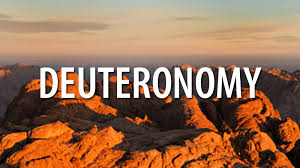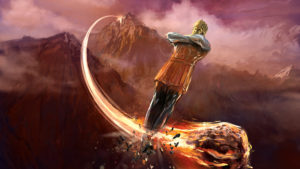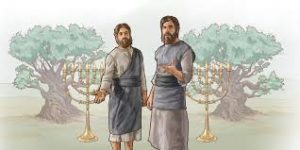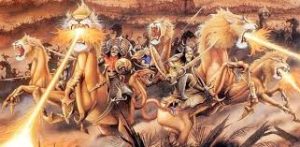Am – Moshe Remembered Sending in the Spies 1: 19-25
Moshe Remembered Sending in the Spies
1: 19-25
Moshe remembered sending in the spies. DIG: In verse 21, is God making an offer they can’t refuse, or one they can? Was their strategy in verse 22 borne out of fear or faith? Head or heart? Wisdom or folly? Can you fill in the details of the spy mission (see Numbers 13-14)?
REFLECT: How can you see beyond the problems and see the opportunities? Spying might be a delaying tactic. How do you try to confirm God’s will rather than do it? Are your eyes of faith bigger than your stomach of fear? How so?
Reviewing the history of the generation of the Exodus, the Israelites traveled from Horeb to Kadesh-barnea. It was a grueling journey, but God had spoken and the people must go forward. From there, twelve spies traveled through the whole Land (Numbers 13:21), and their report was initially positive.
From Horeb to Kadesh-barnea (1:19-21): Remembering the journey that he himself had taken forty years ago with the Exodus generation, Moses recalled: Then we journeyed from Horeb (which is the name used for Mount Sinai in Deuteronomy) and went through a waterless limestone plateau, a great and terrible wilderness, that you saw on the way to the hill country of the Amorites, as ADONAI our God commanded us. It was a journey of more than a hundred miles, and over those dusty and dry miles the prospect of the Promised Land must have become very inviting.40 Then we came to Kadesh-barnea, a major oasis in the arid south (1:19). This place was prominent in Isra’el’s history as a familiar stopping place on her journey (Numbers 13:23-27, 32:8-15).41 They were not in the Promised Land yet, but they were close. No doubt there was excitement in the camp. At last the Exodus generation was about to realize the promise that had been given hundreds of years before to their father Abraham.
Every great accomplishment begins with a vision. We have to see it before we can seize it. Our vision is the picture of what we can be one day. Therefore, Moshe said to the people, “You have come to the hill country of the Amorites, which ADONAI our God is giving to us. See, ADONAI your God has set the Land before you – go up, take possession, as ADONAI God of your fathers has promised you.” The present reality of the Land being given by the LORD to Isra’el is based on YHVH’s perspective. As far as He is concerned, the conquest is an accomplished fact. Only Isra’el’s actual conquest of the Land awaited fulfillment. Reference to ADONAI God of your fathers cements the link between the commanded conquest of Canaan and the LORD’s past promises to Abraham (see the commentary on Genesis Dy – Go, Walk Through the Land, for I am giving it to You), Isaac (see the commentary Genesis Go – Isaac Went to Abimelech King of the Philistines in Gerar), and Jacob (see the commentary Genesis Ii – After Jacob Returned from Paddan Aram, God Appeared to Him Again at Bethel). This great leader also understood that many people see the obstacles but not the objective. Not wanting this to happen, he added: Do not be afraid or discouraged (1:20-21).
Far too often, however, some believers feel that ability to see an obstacle is the mark of maturity and insight. However, usually the problems are the easiest things to see. The sad truth is that many of us look for problems, then use them as an excuse to stay right where we are. The LORD wants us to see beyond the difficulties and give encouragement to those facing challenges.

Moshe remembered sending in the spies (1:22-25): Moshe remembered that he was ready for an assault on inhabitants of Canaan. The community of Isra’el, however, was more cautious and wanted to send out a scout team that would be able to advise the best line of attack and give the people some idea of the kind of opposition to expect and the size of the cities.42 Then all of you came near to me and said: Let’s send men ahead of us to explore the Land for us and bring us back word about the best way we should go, and the cities we will attack first (1:22). Notice, there is no mention of basing the decision whether to go or stay on the spies’ mission. The issue was not whether they should or should not possess the Land. The will of YHVH had already been spoken: The people were to go forward. The spies were sent to map out the strategy for Isra’el’s conquest of the Land.43
Moses remembered approving the mission, saying: The idea seemed good to me, only because you demanded it, so I took twelve men from among you – one man for each tribe (1:23). This is an interestingly different way of describing the initiative of sending out the spies from how it is described in Numbers, where it is said to be at the command of YHVH (Numbers 13:1-3). But there is no need to assume that everything Moshe interpreted as a word or command from Ha’Shem had to come by direct revelation. The LORD could speak to him through the ideas and suggestions of others. In a similar way, 1:9-14 describes a proposal that originally came from Jethro as if it were Moshe’s own idea. It is perfectly natural to envision a suggestion of the people being interpreted by Moses as the will of God, and then the actual command being given by Moses himself.44
They turned and went up into the hill country, and they came to the beautiful Wadi Eshcol (so named because of the grape-cluster, eshcol, which was taken from there) in a fertile valley near Hebron, and spied it out (1:24). The Land the spies explored was a striking contrast to the great and terrible wilderness through which they recently passed (see the commentary on Numbers Cb – Spying Out the Land). The twelve men explored the Promised Land for forty days and returned to the camp with the enthusiastic, unanimous report that everything YHVH had said about it was accurate. The report shouldn’t have surprised anyone because God’s Word is always true.
They took in their hands some of the fruit of the land and brought it down to us from the mountainous country in the south which they had traveled. They also brought back word (Hebrew: ha-d’varim, meaning words, matters, things, commandments, events or reasons) to us and said: Good is the Land that ADONAI our God is giving to us, it truly flows with milk and honey, and this is its fruit (Deuteronomy 1:25; Numbers 13:26-27). All the spies, even the ten who brought an evil report about the impossibility of conquering the country, spoke well of the Land itself in the presence of Moses and the authorities. The report that the Land is good is a kind of climax, which confronted the people with a decision. This alone would have been enough for the eyes of faith to see. ADONAI had not deceived them. The evidence lay before their eyes. He is trustworthy.
It has been said that faith is not believing in spite of the evidence – that’s superstition – but obeying in spite of the circumstances and consequences. How much more evidence did the people need that their God was able to defeat the enemy, and be with them as they took possession of their Land? Hadn’t He defeated and disgraced all the false gods of Egypt, starting with Pharaoh himself, protected Isra’el, and provided for them on their journey through the wilderness? Ha’Shem’s commandments always provide a way to carry them out. The righteous of the TaNaKh, then, and believers, today, need only trust and obey.
Dear Mighty Father God, How much I love You! How wonderful to have You by my side, guiding and caring for me. I praise You for Your faithful steadfast love. Even when life seems full of “giants” about to attack, help me remember that nothing is beyond Your mighty power. You saw this problem before it happened, and You hold the solution in Your hand – For nothing will be impossible with God (Luke 1:37). Praise You that Your love delights in helping Your child. I want to serve and worship You always. In Your holy Son’s name and power of resurrection. Amen













 Habiendo alcanzado su cenit de poder y con Israel postrado a sus pies, el anticristo dirige su atención hacia los diez reyes invasores del este y el norte. En el curso de este conflicto, parece ser asesinado. Sin embargo, la bestia aparentemente llegará a su fin: …y no tendrá quien lo ayude. Su cuerpo parece ser destruido y entregado al fuego devorador (Daniel 11:45b y 7:11). Pero todo esto es una alusión a Satanás, el padre de las mentiras. El padre falso organizará la muerte falsa de su hijo falso para establecer una resurrección falsa. En lo que respecta a Satanás, en este punto, todo va según lo planeado.
Habiendo alcanzado su cenit de poder y con Israel postrado a sus pies, el anticristo dirige su atención hacia los diez reyes invasores del este y el norte. En el curso de este conflicto, parece ser asesinado. Sin embargo, la bestia aparentemente llegará a su fin: …y no tendrá quien lo ayude. Su cuerpo parece ser destruido y entregado al fuego devorador (Daniel 11:45b y 7:11). Pero todo esto es una alusión a Satanás, el padre de las mentiras. El padre falso organizará la muerte falsa de su hijo falso para establecer una resurrección falsa. En lo que respecta a Satanás, en este punto, todo va según lo planeado. Cualquier tipo de paz que haya existido entre el anticristo y los diez reyes que gobiernan los diez reinos del mundo llegará a su fin cuando la bestia comience a tomar el control político del mundo. Así, el segundo conflicto mundial comienza cuando el anticristo les declara la guerra a los diez reyes.291 El tiempo del fin es una referencia al período de la Gran Tribulación.
Cualquier tipo de paz que haya existido entre el anticristo y los diez reyes que gobiernan los diez reinos del mundo llegará a su fin cuando la bestia comience a tomar el control político del mundo. Así, el segundo conflicto mundial comienza cuando el anticristo les declara la guerra a los diez reyes.291 El tiempo del fin es una referencia al período de la Gran Tribulación. … y tenía en su mano un pequeño rollo abierto; y poniendo su pie derecho sobre el mar y el izquierdo sobre la tierra (10:2). El pequeño rollo, estaría en su mano izquierda (ver 10:5). Este es el segundo rollo mencionado en el libro de Apocalipsis. El primer rollo en el Capítulo 5 contenía los siete sellos. Seis fueron los juicios de los Sellos del Capítulo 6, y el séptimo sello contenía los siete juicios de las trompetas, que describen los eventos en la primera mitad de la Tribulación. El contenido del pequeño rollo trata de la séptima trompeta, que es un misterio.286
… y tenía en su mano un pequeño rollo abierto; y poniendo su pie derecho sobre el mar y el izquierdo sobre la tierra (10:2). El pequeño rollo, estaría en su mano izquierda (ver 10:5). Este es el segundo rollo mencionado en el libro de Apocalipsis. El primer rollo en el Capítulo 5 contenía los siete sellos. Seis fueron los juicios de los Sellos del Capítulo 6, y el séptimo sello contenía los siete juicios de las trompetas, que describen los eventos en la primera mitad de la Tribulación. El contenido del pequeño rollo trata de la séptima trompeta, que es un misterio.286 El juicio de la sexta trompeta concluye la primera mitad de la Gran Tribulación y es seguido de una pausa temporal en los juicios que se derraman del cielo. Pero eso no significa que la tierra esté en paz. Tan pronto como el anticristo tenga su imagen establecida en el Lugar Santísimo del templo de la tribulación por el falso profeta y se declare a sí mismo como Dios, comenzará un genocidio sistemático de los judíos como se ve en los Capítulos 12 y 13. Las naciones estarán en caos mientras el anticristo continúa tomando gradualmente los sistemas políticos, económicos y religiosos del mundo entero.
El juicio de la sexta trompeta concluye la primera mitad de la Gran Tribulación y es seguido de una pausa temporal en los juicios que se derraman del cielo. Pero eso no significa que la tierra esté en paz. Tan pronto como el anticristo tenga su imagen establecida en el Lugar Santísimo del templo de la tribulación por el falso profeta y se declare a sí mismo como Dios, comenzará un genocidio sistemático de los judíos como se ve en los Capítulos 12 y 13. Las naciones estarán en caos mientras el anticristo continúa tomando gradualmente los sistemas políticos, económicos y religiosos del mundo entero. Luego se da la descripción de la mujer, ella es vista como muy rica e influyente. Y la mujer estaba vestida de púrpura y escarlata, y adornada de oro y piedras preciosas y perlas, sosteniendo en su mano una copa de oro llena de abominaciones y de las inmundicias de su fornicación (17:4). Ella será fabulosamente rica, y el énfasis estará
Luego se da la descripción de la mujer, ella es vista como muy rica e influyente. Y la mujer estaba vestida de púrpura y escarlata, y adornada de oro y piedras preciosas y perlas, sosteniendo en su mano una copa de oro llena de abominaciones y de las inmundicias de su fornicación (17:4). Ella será fabulosamente rica, y el énfasis estará  Y vi a la mujer embriagada de la sangre de los santos, y de la sangre de los mártires de Jesús; y al verla, me asombré con gran asombro (17:6). Esto responde a la pregunta de quién asesinó a los mártires de la Tribulación que fueron vistos debajo del altar de oro en el cielo (6:9-11). Será la falsa súper iglesia. Millones de gentiles serán salvados como resultado del ministerio de los 144.000 judíos, pero sufrirán el martirio a manos de la religión mundial. Lo que vemos aquí es la forma final de apostasía religiosa, que termina con la formación de una “súper iglesia” mundial. Es la forma final de la mujer Jezabel quien fue arrojada a la Gran Tribulación (2:20-22), y se unió a la iglesia apóstata de Laodicea (3:14-22). Esta será la novia falsa del falso mesías, presentada como una prostituta, mientras que la verdadera Novia de Cristo se presenta como una virgen pura (Segunda Corintios 11:2; Efesios 5:25-27; y Apocalipsis 19:6-8).283
Y vi a la mujer embriagada de la sangre de los santos, y de la sangre de los mártires de Jesús; y al verla, me asombré con gran asombro (17:6). Esto responde a la pregunta de quién asesinó a los mártires de la Tribulación que fueron vistos debajo del altar de oro en el cielo (6:9-11). Será la falsa súper iglesia. Millones de gentiles serán salvados como resultado del ministerio de los 144.000 judíos, pero sufrirán el martirio a manos de la religión mundial. Lo que vemos aquí es la forma final de apostasía religiosa, que termina con la formación de una “súper iglesia” mundial. Es la forma final de la mujer Jezabel quien fue arrojada a la Gran Tribulación (2:20-22), y se unió a la iglesia apóstata de Laodicea (3:14-22). Esta será la novia falsa del falso mesías, presentada como una prostituta, mientras que la verdadera Novia de Cristo se presenta como una virgen pura (Segunda Corintios 11:2; Efesios 5:25-27; y Apocalipsis 19:6-8).283 Y daré a mis dos testigos, y profetizarán durante 1.260 días vestidos de tela de saco (11:3). Durante 42 meses de treinta días, o tres años y medio, ellos estarán vestidos de cilicio. Los testigos es la forma plural de martus, de la que deriva la palabra mártir, ya que muchos testigos de Jesús el Cristo en el cuerpo de primeros creyentes pagaron con sus vidas por sus creencias.277 Estos dos testigos son claramente profetas del juicio. La tela de saco simbolizará el sufrimiento y la pena en todo el mundo. Ellos predican tanto al judío como al
Y daré a mis dos testigos, y profetizarán durante 1.260 días vestidos de tela de saco (11:3). Durante 42 meses de treinta días, o tres años y medio, ellos estarán vestidos de cilicio. Los testigos es la forma plural de martus, de la que deriva la palabra mártir, ya que muchos testigos de Jesús el Cristo en el cuerpo de primeros creyentes pagaron con sus vidas por sus creencias.277 Estos dos testigos son claramente profetas del juicio. La tela de saco simbolizará el sufrimiento y la pena en todo el mundo. Ellos predican tanto al judío como al  El anuncio del número en el ejército demoníaco es seguido por una descripción de cómo se veían. Fue difícil para Juan describir lo que vio. Así que usa las palabras como y parecía indicando que él estaba usando símbolos para describir los demonios lo mejor que pudo a sus lectores. Y en la visión vi a los caballos y a los que los montaban, que tenían corazas de fuego, de jacinto y de azufre; y las cabezas de los caballos eran como cabezas de leones, y de sus bocas salía fuego, humo y azufre (9:17). Algunos piensan que esto se refiere a doscientos millones de chinos. Pero sería difícil encontrar una sola persona china que se vea así, y mucho menos doscientos millones de chinos. No, una vez más, estos son demonios.
El anuncio del número en el ejército demoníaco es seguido por una descripción de cómo se veían. Fue difícil para Juan describir lo que vio. Así que usa las palabras como y parecía indicando que él estaba usando símbolos para describir los demonios lo mejor que pudo a sus lectores. Y en la visión vi a los caballos y a los que los montaban, que tenían corazas de fuego, de jacinto y de azufre; y las cabezas de los caballos eran como cabezas de leones, y de sus bocas salía fuego, humo y azufre (9:17). Algunos piensan que esto se refiere a doscientos millones de chinos. Pero sería difícil encontrar una sola persona china que se vea así, y mucho menos doscientos millones de chinos. No, una vez más, estos son demonios. Pero no será el apagón lo que haga de este el primer juicio de Ayes. Se lanzará una gran cantidad de demonios para la primera de las dos invasiones demoníacas.262 Y del humo salieron langostas a la tierra, y les fue dado poder como el poder que tienen los escorpiones de la tierra (9:3), los demonios aparecen como langostas y pican como escorpiones. Se puede ver una vista previa de este tipo de plaga en Éxodo 10:1-20 (ver el comentario sobre Éxodo Br – La plaga de langostas). Sin embargo, la descripción de las langostas más adelante en 9:7-10 muestra claramente que estas langostas no pueden ser tomadas literalmente como tales. No serán como los saltamontes de cuernos cortos que plagaron Egipto. No, se trata de demonios y salen del Abismo, que se menciona siete veces en el libro de Apocalipsis (9:1, 9:2, 9:11, 11:7, 17:8, 20:1 y 20:3).
Pero no será el apagón lo que haga de este el primer juicio de Ayes. Se lanzará una gran cantidad de demonios para la primera de las dos invasiones demoníacas.262 Y del humo salieron langostas a la tierra, y les fue dado poder como el poder que tienen los escorpiones de la tierra (9:3), los demonios aparecen como langostas y pican como escorpiones. Se puede ver una vista previa de este tipo de plaga en Éxodo 10:1-20 (ver el comentario sobre Éxodo Br – La plaga de langostas). Sin embargo, la descripción de las langostas más adelante en 9:7-10 muestra claramente que estas langostas no pueden ser tomadas literalmente como tales. No serán como los saltamontes de cuernos cortos que plagaron Egipto. No, se trata de demonios y salen del Abismo, que se menciona siete veces en el libro de Apocalipsis (9:1, 9:2, 9:11, 11:7, 17:8, 20:1 y 20:3).